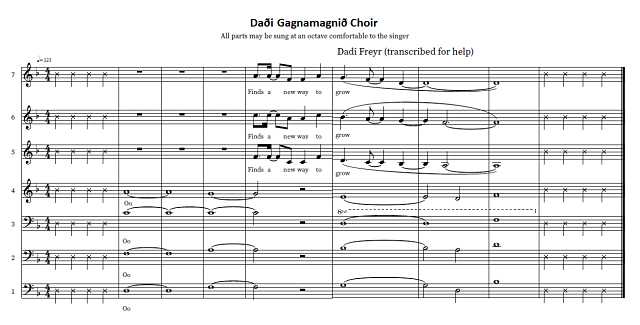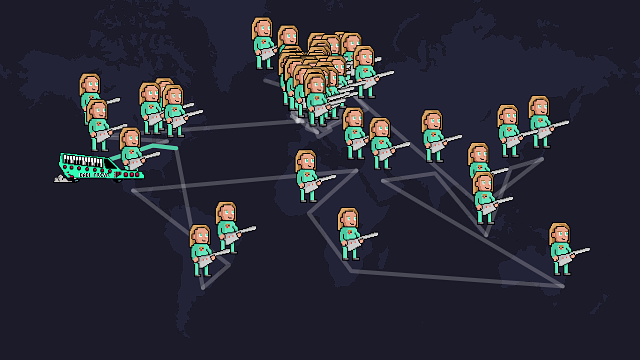The interview between Ben Robertson and Daði Freyr took place on Friday May 14th. On Sunday May 16th, a routine test for COVID-19 found that one member of the Icelandic delegation had tested positive for the virus. As a result of that the Icelandic team did not attend the Opening Ceremony for the Song Contest that day, and all self-isolated and took a PCR test.
The Icelandic delegation produced negative PCR tests on May 16th, and, as per protocol, took PCR tests again on May 19th. At this testing it was found that one member of Gagnamagnið had tested positive for COVID-19. The rest of the delegation tested negative, yet nevertheless it was decided that the band could not take part in Song Contest live, as Gagnamagnið “only want to perform together as a group.”
Therefore, Iceland will be represented in the Eurovision Song Contest by a rehearsal clip that was recorded on Thursday May 13th, live from the Rotterdam arena. We wish everybody in the Icelandic delegation well at this most devastating turn of events.
As you can clearly see by the article below, the run up to the Eurovision Song Contest was of huge anticipation and opportunity for the group, and for Daði himself. We all hope that current circumstance doesn’t take away from everything the whole team has worked on for the last year.
Many people say that Iceland would have won the 2020 Eurovision Song Contest had it taken place. Such a claim is based not just on the 27 million viewers that ‘Think About Things’ has on YouTube. In replacement shows in Sweden, Norway and Austria, run by the host broadcasters in each nation, Iceland was the clear winner. The song’s commercial success too can not be discounted, charting across Europe and being the first Eurovision song to hit the UK top 40 since Måns Zelmerlöw’s ‘Heroes’ in 2015.
With no national selection to win in Iceland and this pandemic cancelling all of his planned European tour in March and April, there’s been plenty of time to prepare for the 2021 Eurovision Song Contest. In recent weeks and months Daði and his team have promoted his entry in ways never before seen at Eurovision.
A 2D Platformer
Available for mobile devices via Google Play or the Apple Store (with a 4.9/5 and 5/5 rating respectively), ‘Think About Aliens‘ is the completely free platform game featuring Daði and the rest of his band at Eurovision, Gagnamagnið, the aim of the game is to defeat aliens in an intense platform with plenty of challenge. There are also boss battles, which take the format of rhythm games, hitting different musical notes to play the tunes of Daði’s music.
The creation of a game isn’t anything new for Daði and the team, with Daði himself making a game in 2017, which he describes as “very bad”.
“It was just my pixelated head running around trying to save the rest of Gagnamagnið from fail notes. It was as simple as games get. I think the eyes moved to the side when you moved to the side but that was the entire animation. So it has been a part of Gagnamagnið for a while to have a video game.
I actually don’t even know where it is. I found the file at some point and it was corrupted or something. I would have definitely posted at some point if I could have found it. I put it on Newgrounds and they changed their flash player settings or whatever. It’s forever lost I think.
“Joey, the red haired Gagnamagnið, he is studying computer science so he is starting to code and he was the project manager for the game. Then we got people from Instagram we said hey, we want to make a game, do you know how to make a game, and we got a team together from around the world.”
A Choir Of Thousands
This year delegation sizes at the Eurovision Song Contest have been cut from a maximum of 38 to 20, in order to reduce the risks of viral infection during this pandemic era. To help some delegations with that, this year the Eurovision Song Contest offers the option to have pre-recorded vocals included in the backing track. This means that for the first time the number of vocals simultaneously on stage can be more than just six.
Ever the opportunist, noting this “might be the first and only time this is ever going to be possible”, Daði Freyr took to social media to ask for singers from around the world to join him on stage. Singers were invited to record themselves singing one or more of the short vocal parts that were used for the backing choir you can hear before the final chorus. Eventually, this led to over 1000 singers submitting their tracks (including Jendrik, this year’s Germany entrant), and over 2000 vocal parts, way more than Daði expected.

Sheet music for the vocal parts in ’10 Years’ (Image: @kitharodos on Twitter)
“I realised on the first day that I had to hire somebody to put it all together because it was both – some people recording it on their phone and some people didn’t have the click and we had to edit it all together. It was a lot of work to put together. It was something like just 40 hours or so of just editing, before mixing. It went a little bit further than I had planned.”
A Music Video Of Japanese Culture
At the end of March the music video for ‘10 Years’ was released onto Daði’s 189,000 subscriber strong YouTube channel. Nothing unusual in that, but what is unusual is the set up in scale and investment in the video. Thematically the song takes a unique twist too, with Daði explaining to the EBU that the song is “very much inspired by old Japanese monster movies, the Power Rangers and maybe even a little bit of Paw Patrol.”
“I had the idea for the video before I had the idea for the song”, Daði tells me, explaining how it was his passion for these cultures that he wanted to include. Even though the video strikes of big budget, it’s the homemade attention to detail that makes it so crazily unique. The costumes from the robot and monster, wore by Daði and his wife Árný in the music video, were completely handmade by the couple and their friends and family.
Brewing Up Trouble
There’s not many Eurovision acts that can claim to have their own beverage, but in collaboration with Borg Brygghús that is exactly what Daði can claim. Known as, you guessed it, ‘10 Beers’, it was Daði who first put out the contact to the craft brewery, and collaborated with them to find the right taste to match his beer-loving palette.
It’s not a surprise to find out that Berlin-based Daði is a fan of lagers and pilsner, and ‘10 Beers’ is a cross between this and pale ales, another Daði favourite. The result is a fruity and light drink that the combination of mosaic and citra hops provides and Daði is only “slightly lying” in saying this is his favourite beer of all time.

Can of ’10 Beers’ in Gagnamagnið branding (Photo: Borg Brygghús)
A Whole Concert Of Covers
It’s very much not unusual for Eurovision artists to release some Song Contest flavoured covers in the run up to their arrival in the host city.
It is unusual that they make a whole concert out of them.
Mixed completely by himself, JúróDaði is a simple show that he produces where he plays his version of different Eurovision songs. The concept comes from the huge tradition of Icelandic artists having huge Christmas concerts, just singing Christmas songs, that Daði reckons makes up 50 % of the total concert attendance of the Icelandic population.
Daði explains that he wanted to “get in on that action” himself in 2019, when he made his own concert “When Daði Stole Christmas”. In what Daði refers to as a “sweaty party” in the basement of Reykjavík’s Hard Rock Cafe, full of “high energy, synth pop techno versions of famous Christmas songs”.
The next step was to do the same for Eurovision songs, and, following on from the popularity of that evening, he was invited to have one hour of covers on Icelandic television last year during their replacement programming for the cancelled Eurovision Song Contest. Such was the popularity, he did the same thing this year that was viewable live on the official Eurovision Song Contest YouTube channel.
And while these shows have been recorded at home, I can assure you that they are fantastic live. Before the pandemic truly hit Europe Daði was in Stockholm for Melfest WKND in 2020, and his set was the highlight of the night. I’m sure he’ll be a big booking for the fan community in the years to come.
Touring In Your Bedroom
March and April of 2021 were meant to provide Daði with one of the biggest tours across Europe in the run up to the Eurovision Song Contest, with dates planned in ten different European countries. Sadly, that wasn’t meant to be, yet the UK part of that tour has already been rescheduled to November.
The website road2rotterdam.com has a route where Daði has virtually travelled across Europe from city to city and, rather than go to a concert, fans have been able to have Daði appear in their own living room giving a private show.

The virtual tour locations go around the world (Photo: road2rotterdam.com)
This it turns out is not an initiative from Daði himself, but instead from a British based company, Landmark. All Daði had to do was record his part via green screen and they took care of all of the rest.
Being A Social Media Icon
Using social media is of course a part of being an artist in today’s world. What has been striking about Daði’s use of social media is how often he is not just making his own content, but commenting on those of others, such as interviews with him, and even seemingly random videos elsewhere. The example that most recently struck me most was how he commented on the YouTube upload of Ukraine’s second rehearsal from Rotterdam, where lead singer Kateryna Pavlenko had to be replaced last minute by a stand-in artist, Emmie van Stijn.
“It’s not that long ago that I started commenting on Youtube videos. I think it is fun to see the reaction of people and what they think of my opinion. I just like being in direct contact with the people that are listening to me. It’s so new to me to have such a big audience and I’ve been on social media trying to promote my music for 15 years or something like that. So, it’s like, every person was a much bigger percentage for such a long time. I’m still trying to have everybody involved, and plus, it’s fun.”
A Goal Beyond The Song Contest
There’s much more that could be said about Daði and Gagnamagnið, and so much more that there is to explore. Depending on how the future looks there are other ideas such as themed action figures on the cards for a possible future.
But are a team of six there are no plans for the group to formally continue. Gagnamagnið is a project put together for the premise of competing in the Icelandic selection Söngvakeppnin or the Eurovision Song Contest itself. After the Song Contest, the plan is to return to their relatively humble lives and trades back home.
Except for Daði. ‘Think About Things’ and the huge change in the attention that followed its release led to the chance of having a career, a paying-the-bills-and-touring-Europe type of career, into a reality. That reality has not yet manifested itself, thanks to the pandemic, and this new life of Daði as a professional musician is in reach, but not yet in his grasp.
Perhaps that’s why there’s so much time and energy that goes into each part of this Eurovision entry. There’s plenty of attention to detail on stage. The colourful backdrop, easy-to-learn-but-hard-to-master dance routine and gimmicks with more than just a nod to previous Eurovision moments are all very intentionally done. Remember that, just like ‘Think About Things’, Daði had thought about the stage show and concept before writing this year’s Eurovision song. These are special and unique performances, and very much his creation.
And that he’s had such an influence on the branding and promotion outside the three minutes on stage is testament to how much this means. ‘10 Years’ may or may not place well in the Song Contest come Saturday night, but regardless the true success doesn’t come from winning or losing, the success comes from if Daði Freyr is able to become a full time songwriter and performer.
Ultimately that core goal is the reason why there is a video game, a choir made of fans, and all the other elements explained above. The Eurovision Song Contest as a medium and a platform has provided opportunities like no other to Daði Freyr, and he is taking every opportunity that he can.









